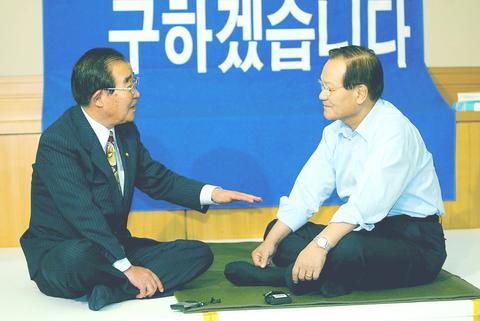South Korea's main opposition leader began a hunger strike yesterday, saying he would stop only if President Roh Moo-hyun lifted a veto of parliament's bid to name a special counsel to probe political funding scandals.
The protest by Choe Byung-yol, who leads the Grand National Party (GNP), raised tensions still further after Roh's decision on Tuesday to reject the bill from the opposition-led National Assembly just months before an April parliamentary election.

PHOTO: AP
"Choe Byung-yol will go on hunger strike from today at the party's headquarters until President Roh withdraws his veto," a GNP spokesman said by telephone.
The president argued that more time was needed for a separate funding inquiry by prosecutors that has expanded from a probe into some of his aides to take in opposition parties and business groups.
All 149 parliamentarians from the Grand National Party, which dominates the 273-seat single-chamber assembly, offered their resignation to Choe as an additional protest, the party said.
"GNP members have agreed not to attend the annual National Assembly session," a party official said.
That could hold up legislation in the remaining two weeks of this year's full session, notably next year's budget for Asia's fourth-largest economy. Domestic political tensions also do little to help resolve the North Korea nuclear crisis.
The spokesman said Choe was ready to debate with Roh on television. Roh is scheduled to appear on a talk show on Friday.
"Before proposing one-on-one talks, what he needs to do is to return to the parliament," a presidential spokesman told reporters. "Choe has engaged in blackmail politics by announcing outdoor protests. And now he's launching such an extreme political action as a hunger protest, unnerving the public."
After winning last December's presidential election, Roh came to power in February vowing to break the link between politics and the country's family-run "chaebol" business conglomerates.
But a close Roh aide is now under investigation for taking 1.1 billion won (US$915,000) from the scandal-tainted SK Group and other aides have been implicated.
Roh's opponents, who are spread among three parties and hold the two-thirds of seats necessary to override a presidential veto, vowed to fight him over the bill. But they have yet to say whether they would seek to overturn the veto in parliament.
Prosecutors investigating the fund-raising practices of political parties during last year's presidential election, in which Roh narrowly upset a conservative candidate, have raided units of South Korea's two largest chaebol.
On Monday, prosecutors turned up at a unit of the country's largest conglomerate, Samsung Group. Last week, they knocked on the doors of a unit of LG Group, with the similar aim of investigating links between politicians and business leaders.
In mid-October, after news emerged about his close aide, Roh called for a referendum on his rule and ordered the funding probe. The referendum proposal appears to have died a quiet death amid the scandal investigation and political squabbling.
The Grand Nationals say that only an independent investigator could hold an inquiry free of interference by the administration. Choe apologized last month when it was disclosed the GNP itself had received 10 billion (US$9 million) won from SK last year.

STEPPING UP: Diminished US polar science presence mean opportunities for the UK and other countries, although China or Russia might also fill that gap, a researcher said The UK’s flagship polar research vessel is to head to Antarctica next week to help advance dozens of climate change-linked science projects, as Western nations spearhead studies there while the US withdraws. The RRS Sir David Attenborough, a state-of-the-art ship named after the renowned British naturalist, would aid research on everything from “hunting underwater tsunamis” to tracking glacier melt and whale populations. Operated by the British Antarctic Survey (BAS), the country’s polar research institute, the 15,000-tonne icebreaker — boasting a helipad, and various laboratories and gadgetry — is pivotal to the UK’s efforts to assess climate change’s impact there. “The saying goes

Floods on Sunday trapped people in vehicles and homes in Spain as torrential rain drenched the northeastern Catalonia region, a day after downpours unleashed travel chaos on the Mediterranean island of Ibiza. Local media shared videos of roaring torrents of brown water tearing through streets and submerging vehicles. National weather agency AEMET decreed the highest red alert in the province of Tarragona, warning of 180mm of rain in 12 hours in the Ebro River delta. Catalan fire service spokesman Oriol Corbella told reporters people had been caught by surprise, with people trapped “inside vehicles, in buildings, on ground floors.” Santa Barbara Mayor Josep Lluis

Police in China detained dozens of pastors of one of its largest underground churches over the weekend, a church spokesperson and relatives said, in the biggest crackdown on Christians since 2018. The detentions, which come amid renewed China-US tensions after Beijing dramatically expanded rare earth export controls last week, drew condemnation from US Secretary of State Marco Rubio, who on Sunday called for the immediate release of the pastors. Pastor Jin Mingri (金明日), founder of Zion Church, an unofficial “house church” not sanctioned by the Chinese government, was detained at his home in the southern city of Beihai on Friday evening, said

TICKING CLOCK: A path to a budget agreement was still possible, the president’s office said, as a debate on reversing an increase of the pension age carries on French President Emmanuel Macron yesterday was racing to find a new prime minister within a two-day deadline after the resignation of outgoing French Prime Minister Sebastien Lecornu tipped the country deeper into political crisis. The presidency late on Wednesday said that Macron would name a new prime minister within 48 hours, indicating that the appointment would come by this evening at the latest. Lecornu told French television in an interview that he expected a new prime minister to be named — rather than early legislative elections or Macron’s resignation — to resolve the crisis. The developments were the latest twists in three tumultuous